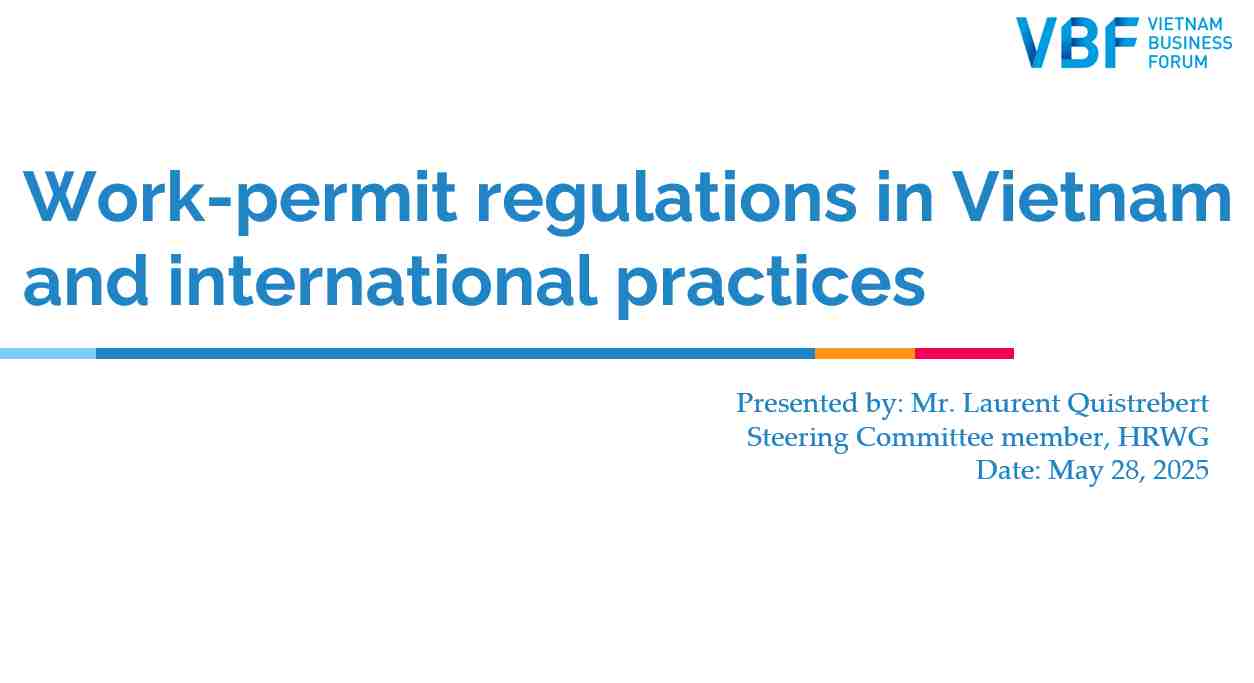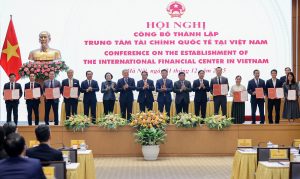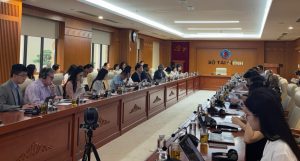Resident Vietnam & VBF Engage with Ministry on Work Permit Improvements
On May 28, 2025, as part of Resident Vietnam’s ongoing advocacy efforts, our team had the opportunity to deliver a presentation recommending various improvements to the work permit process. This presentation comes as the government is preparing to replace Decree 152/2020/NĐ-CP and Decree 70/2023/ND-CP, which govern work permits and the employment of foreign nationals in Vietnam.
This presentation was delivered during a Vietnam Business Forum (VBF) dialogue with representatives from the Employment Department under the Ministry of Home Affairs in Hanoi. The session was facilitated by the Foreign Investment Agency (Ministry of Planning and Investment), and brought together key stakeholders, including representatives from EuroCham, AmCham, and KoCham.
 The presentation highlighted the main challenges encountered by businesses operating in Vietnam. For each challenge, we shared relevant regional benchmarks and conveyed recommendations to the relevant authorities.
The presentation highlighted the main challenges encountered by businesses operating in Vietnam. For each challenge, we shared relevant regional benchmarks and conveyed recommendations to the relevant authorities.
Vietnam’s current work permit system presents several significant challenges for foreign employers and professionals:
- The requirement for a recruitment announcement and a foreign labor demand for each role prior to apply for work permit for foreign talent is often impractical, causing delays, raising confidentiality concerns, and proving unsuitable for senior or short-term roles.
- The overall work permit process is complex and cumbersome, involving multiple steps and extensive document legalization, leading to inefficiencies and uncertainty. Additionally, the location-specific nature of work permits restricts employee mobility within Vietnam, complicating business operations across multiple sites. A clear mechanism is needed for employees holding work permits sponsored by their company in Vietnam and who work at third-party vendors, suppliers, or customer sites, ensuring full compliance and transparency with labor authorities.
- Whether a foreign national is working for just a few months on a project, or is in Vietnam on a full, two-year assignment, the same extensive & burdensome work permit process applies.
- The lack of permit categories tailored to different work situations, such as short-term missions, specialized roles, or high-skilled professionals, further reduces flexibility.
- Finally, the current restrictive ‘30-day/3-trip per year’ rule for work without a permit is difficult to manage and misaligned with real business needs.

Vietnam’s Work Permit Regulations vs. Regional Peers: How Do They Stack Up?
Vietnam’s work permit system stands out in the region for its procedural rigidity, administrative burden and often misaligned with the operational realities of multinational companies. Most countries in the region do not require a recruitment announcement or foreign labor demand approval, especially for short-term roles or intra-company transfers for which less onerous documents required applies, enabling faster onboarding. Document requirements are typically limited to essential items, and do not require lenghty legalization processes.
Work permits in many neighboring countries are valid nationwide or allow flexible declarations of work locations, enabling mobile work arrangements that reflect modern business models, such as contract manufacturing model, to better align with how companies operate in practice. Additionally, regional peers offer simplified procedures or exemptions for short-term assignments, while Vietnam applies the same complex process regardless of assignment duration—resulting in reduced agility and a lengthy, burdensome preparation period.
What Key Recommendations Were Discussed for Potential Inclusion in the Upcoming Work Permit Decree?
While the draft decree introduces some positive changes to the existing regulations, many critical issues remain unaddressed and would continue posing challenges for companies and organizations operating in Vietnam. These concerns were clearly highlighted during this important dialogue, along with corresponding recommendations:
- Eliminate or Simplify the Recruitment Announcement Requirement at least for some groups
- Further Streamline the Work Permit Process by removing unecessary procedures and restrict consular legalization to essential documents only
- Enhance the electronic application process, as endorsed by the Ministry of Home Affairs, but more importantly ensure it fully eliminates the need for physical document submissions after online filing.
- Introduce flexibility in expert work permit qualification criteria for new and fast-evolving sectors such as artificial intelligence, and digital transformation, where traditional academic degrees may not exist or, conversely, where accumulating three years of relevant experience may be uncommon due to the sector’s rapid development.
- Allow nationwide work permit validity or the option to list multiple work locations to ensure compliance and flexibility or reintroduce a ‘work location notification’ process for other provinces where the foreigner may be working.
- Introduce flexibility for Short-Term Work or create a simplified short-term work permit valid up to 6 months.
- Modify the current restriction to allow up to 90 days of work per calendar year without a work permit or work permit exemption certificate
- Provide clear and consistent guidance on which companies are eligible for work permit exemption certificates for intra-company transferees, in line with Vietnam’s WTO and other trade agreements commitments.
When Is the New Decree Expected to Come Into Effect?
As of now, the Vietnamese government has not officially announced the effective date of the upcoming decree that will replace the current regulations governing work permits for foreign nationals. However, the draft is currently under review by the Ministry of Justice and may undergo further revisions before finalization. During the recent dialogue, it was confirmed that the decree is expected to be finalized by mid-June and will be implemented promptly upon approval by the government.
Companies and organizations operating in Vietnam are advised to closely monitor official updates to ensure timely compliance with the forthcoming regulatory changes.
For more information or consultation, please contact our team.







